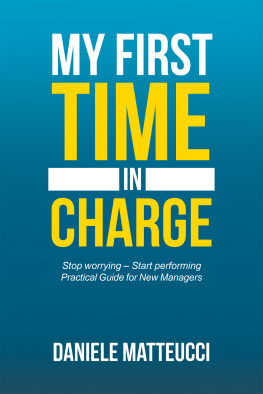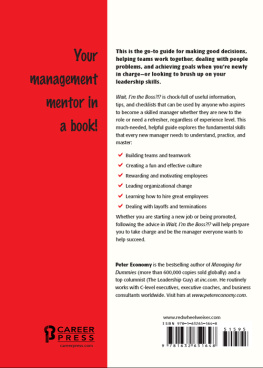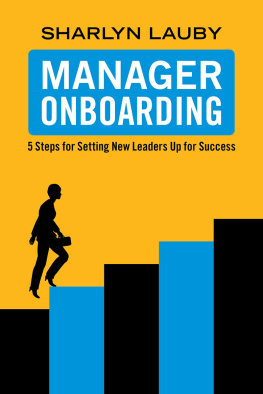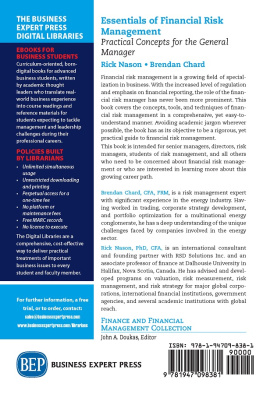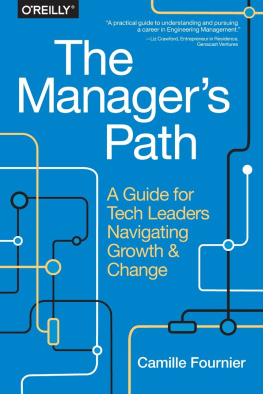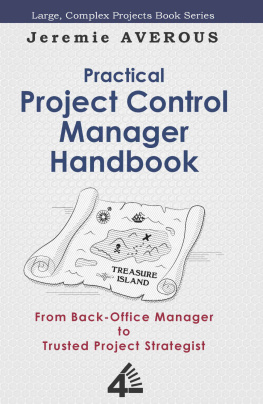MY FIRST
TIME
IN
CHARGE
Stop worrying Start performing
Practical Guide for New Managers
DANIELE MATTEUCCI

AuthorHouse UK
1663 Liberty Drive
Bloomington, IN 47403 USA
www.authorhouse.co.uk
Phone: UK TFN: 0800 0148641 (Toll Free inside the UK)
UK Local: 02036 956322 (+44 20 3695 6322 from outside the UK)
Copyright 2019 Daniele Matteucci. All rights reserved.
No part of this book may be reproduced, stored in a retrieval system, or transmitted by any means without the written permission of the author.
Published by AuthorHouse 11/16/2020
ISBN: 978-1-5462-9934-9 (sc)
ISBN: 978-1-5462-9933-2 (e)
Any people depicted in stock imagery provided by Getty Images are models,
and such images are being used for illustrative purposes only.
Certain stock imagery Getty Images.
Because of the dynamic nature of the Internet, any web addresses or links contained in this book may have changed since publication and may no longer be valid. The views expressed in this work are solely those of the author and do not necessarily reflect the views of the publisher, and the publisher hereby disclaims any responsibility for them.
Contents
T his book is a practical guide that offers pragmatic tools and frameworks to new managers. It is the book I wished to have when I started my journey as a new manager with business responsibilities. I wrote it based on my real-life management experiences. I took notes for about four years of the lessons I learned during my first field assignment. I struggled, but finally I have been successful. I wished during my beginnings to have a mentor to coach me and help me to speed up my learning curve. I wish this book can be a valid practical guide to help others to reduce the stress and worries that inevitably happen when taking on a managerial role for the first time. At the same time, I wish to also offer new managers some help to deliver better and faster high performances.
The book is divided into two main areas: rational and emotional. I believe that a good manager must first of all master the rational part, but to become an excellent and complete manager, he or she cannot forget the emotional part of the job. Blending the rational and emotional parts will be a recipe for success and fulfillment.
PART I
RATIONAL
1
WHAT DO I MEAN BY RATIONAL?
W hen I started as a manager, I thought my job would have been simple: apply tools and principles to reach a business goal. After years of education in business, I came across so many tools that I thought my job would have been extremely easy. Those tools and principles were part of the rational part of the business, such as: setting targets and goals, key performance indicators; planning and control; review and tracking; following up on plans and decisions; on-time delivery and execution; accuracy; sales; prices and quantities; costs; profits; cash flow; credit and debits; standard operating procedures and 80/20 rule.
I studied accounting in high school, business administration at university and business strategy at post-graduate master. At fourteen years old, for the first time, I studied profit and loss statements and balance sheets. Since then, I have always been increasing my understanding and knowledge of these business topics.
My first job, at twenty-five, was in finance. I was involved in business controlling in the headquarters of a multinational eyewear company. Since the beginning I felt comfortable. In fact, I was working with all the tools I had learned in ten years of school. I worked on P&Ls for several subsidiaries. I was checking sales, prices, volumes, and profits. I became familiar with budgeting, forecasting, analysis of actual results, and gap analysis.
After almost five years in finance, I moved to demand planning department. It mainly focused on forecasting worldwide sales. Sales forecasts were shared with production and logistics to make sure the supply chain was set to deliver those volumes. I was also supporting my boss to guarantee the business in all geographies of the world was under control. I felt extremely at ease. I had ten years of business education and five years of experience in finance. Fifteen years with rational tools helped me analyze all the aspects of the business.
That solid base helped me do well in demand planning. I was good at analyzing actuals and predicting future sales. In my last year as Demand Planner, my team achieved a 0.03 percent sales variance versus the forecast we submitted in August on almost sixty million products sold. A remarkable accuracy.
I spent eight years at headquarters (five years in finance and three in business planning). I spent eighteen years on the rational part of the business (ten at school and eight at work). Those eighteen years taught me how to plan, track, measure, and forecast a business in its dry numbers.
To be a solid manager, you need to master the rational part of the business. You cannot be a successful manager if you have gaps in that part. In this book, I present the necessary and helpful tools for my success. Tools are infinite, and the more you have in your toolbox, the better it is. You must understand the tools and be able to really utilize them at work. However, my first suggestion is to focus on the tools that really help you deliver. Focus on mastering a few tools instead of trying to learn many and not being able to use them at all.
However, the second part of this book is related to the emotional aspect of being a manager. After my career in the corporate offices, I moved to a field assignment, and it has been there where I became a real manager. I understood that the rational tools were not enough. I learned that being manager is not as easy as I thought. I had to build other tools, emotional this time, not rational.
Which rational tools did you encounter in your education and work?
Do you feel comfortable working with those tools?
Do you feel gaps? If you feel comfortable, thats great. If you have some gaps, you must study, retrain, and close the gaps.
Start making a list of your weak areas. Determine who can help you and commit to a date to start your gap-closing plan. If you can fix them by yourself, commit to a regular time each week until you close the weaknesses. If you cannot fix them alone, find someone who can help you.
Which are the tools do you feel comfortable with? Write them down and remember always to be confident when using them. Use them as much as possible.
2
TICK TOCK
T he clock does not wait for you. When you are a manager, time is the only resource you cannot influence. To be an effective manager, you have to follow a timeline. You cannot speed up or slow down time. The only thing you can do is make your projects happen in the expected window or earlier. You must shorten the time between ideas and actions . Key questions to ask yourself:
Are you fast at executing ideas?
Is your team fast at executing ideas?
How long will it take for an idea to become real action?
How can you shorten that time?
How can you generate excellent and applicable ideas?
How can you start practical actions?
You can shorten the time from idea to action by defining who is doing what, when, where, and how. That is the essence of the action plan. You will find similar advice in many management and self-help books. It is an excellent piece of advice. You need to build a healthy obsession with the definition of the action plan. It is not enough to define which action to do. You need to identify all the elements: why, who, what, where, when, and how. If you do not have those answers, you do not have an action plan.
Next page
